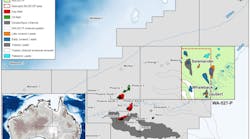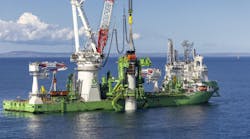HOUSTON, Jan. 10 -- Delta Petroleum Corp., Denver, and several other companies are suing the US government for more than $1.2 billion for preventing them from developing 40 federal leases off California.
The $1.2 billion would be recompense for leasing bonuses and rentals alone. The companies also plan to ask for reimbursement of exploration costs and related expenses. Delta did not name its co-plaintiffs, but Nuevo Energy Co. is one of the affected companies (OGJ Online, July 6, 2001).
The companies are alleging breach of contract, citing post-leasing amendments to a federal statute governing offshore activities that have been interpreted to alter the leaseholders' rights, said the company, adding the government has failed to carry out its obligations under the agreements.
The leases are in the Santa Maria basin off Santa Barbara and San Luis Obispo counties and in the Santa Barbara Channel off Santa Barbara and Ventura counties.
Various delays on the state and federal level, mostly fueled by public opposition, have kept the leases, sold in 1981-1985, from being developed:
-- In 1993, all of the leases were placed under a Directed Suspension of Operations by MMS, pending the completion of a joint federal, county, and industry study known as the California Offshore Oil and Gas Energy Report (COOGER).
-- COOGER, which assessed the onshore constraints to development of the 40 leases, was finished in 1999.
-- Last year, a federal judge ordered the US Minerals Management Service to certify to the California Coastal Commission that extensions of federal leases off Santa Barbara, Calif., are consistent with the state's Coastal Management plan.
At that time, Phillip Gobe, interim president and CEO of Nuevo, said, "As a matter of fact, the CCC concurred with the consistency of the exploration plans for these leases after they were issued between 1981 and 1985. By changing the rules governing these leases and by the actions of other federal, state, and local governments, the development of these offshore resources has been delayed for almost 20 years."
Delta said its share of the claim, directly and through subsidiary Amber Resources Co., is more than $152 million for the lease bonuses and rentals alone. Its claims for exploration costs and related expenses will also be "substantial."
In September, Delta said, "It has become increasingly apparent that environmental groups and most of the state of California -- politicians and constituents -- are adamantly opposed to new development off of their coastline."
It said that the California state senate had urged the President and Congress to negotiate repurchase of the leases. Although, said Delta, it would prefer to drill, it would accept a resolution of either sort.
Coastal Petroleum Co., a unit of Coastal Caribbean Oils & Minerals Ltd., is involved in a suit with some similarities against the state of Florida, saying that by denying it a drilling permit for its offshore properties the state is taking its property without compensation.




